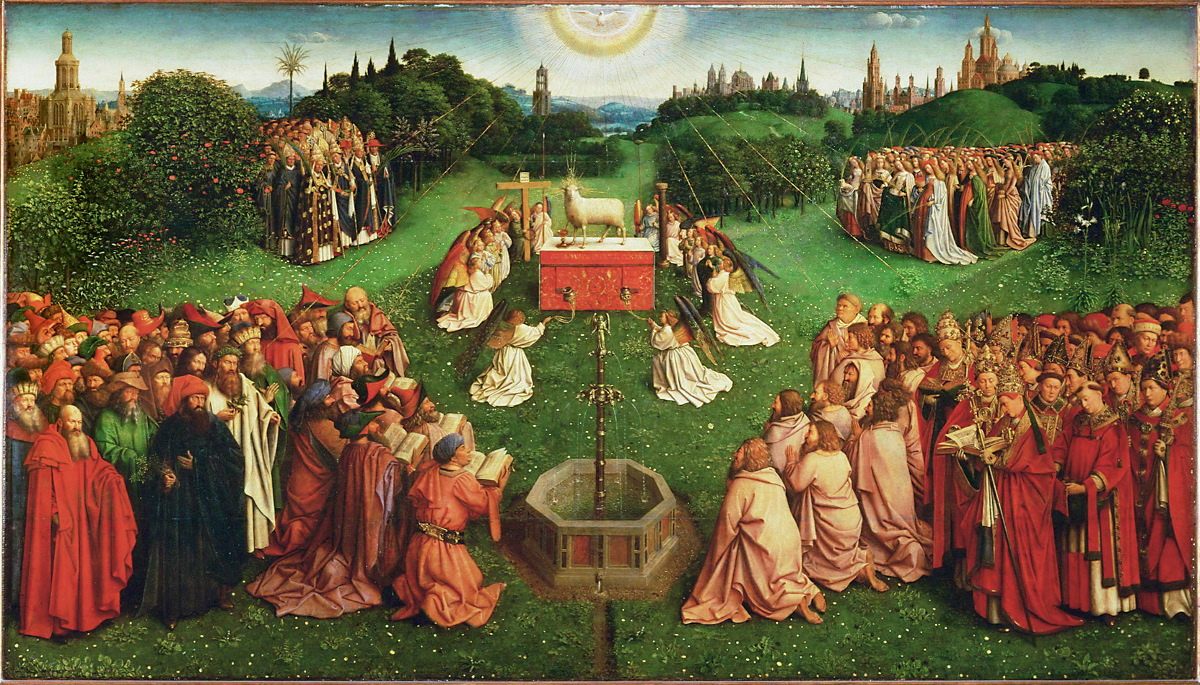The Lamb's Supper: The Bible and the Mass
Lesson Six: Memory and Presence: Communion as the Coming of Christ

Lesson Objectives
- To understand the deep biblical foundations of Jesus’ command that the Eucharist be celebrated “in memory of Me.”
- To see how Scripture portrays Jesus as the Passover Lamb and how that portrayal is reflected in the Mass.
- To understand the Eucharist as parousia, the “coming” of Christ, and as the “daily bread” we pray for in the Our Father.
I. At the Last Supper
A. Calling to Mind His Death
With our last lesson, we reached the climax of the Mass - the Eucharistic Prayer.
The Eucharistic Prayer is a prayer of remembrance. So is the Mass.
As we saw in the last lesson, the various prefaces to the Eucharistic prayers recall the great events in salvation history. These great events are presented as a prelude to the summit of salvation history - Christ's institution of the Eucharist at the last supper.
The Eucharistic prayers themselves are punctuated with expressions like "memento, Domine" ("Remember, Lord").
In Eucharistic Prayer I, the most ancient of the prayers, we ask God to remember the living and the dead, and we recall by name saints and martyrs, as well as the biblical sacrifices of Abel, Abraham, and Melchizedech. And, in the words of the prayer, we "celebrate the memory of Christ," especially His passion, resurrection, and ascension.
In the Eucharistic Prayers, the Mass is clearly seen as "the memorial of our redemption" (Eucharistic Prayer IV) in which, "calling to mind the death [He] endured for our salvation" (Eucharistic Prayer III), we relive the "memory of His death and resurrection" (Eucharistic Prayer II).
But words like "memorial" or "remembrance" - as they're commonly understood - don't do justice to what happens in the Eucharist. Nor do they adequately translate all that Jesus intended to convey when He commanded: "Do this in memory of me" (see Luke 22:19; 1 Corinthians 11:24).
B. Remembering His Covenant
This command, issued at the last supper, evokes an ancient strand of biblical tradition.
Remembrance is a key theme in the Old Testament. Sometimes when you read the word "remember" in Scripture, it simply means what it means to us today: "don't forget."
But when referring to God's "remembering," the word means much more.
For example, after the flood, God promises to "remember" His covenant and never again destroy the world by water (see Genesis 9:15-16; note: the New American Bible translation has "recall," but this weakens the force of the Hebrew).
It's not as if God can ever forget His covenant. Here, and elsewhere in the Old Testament, when God "remembers," He is acting to accomplish His will - answering prayers, granting forgiveness, saving, and blessing His people (see Genesis 30:22; 1 Samuel 1:19-20; Psalm 98:3; 105:42).
We retain this sense in the Mass with such prayers as: "Lord, remember your Church throughout the world" (Eucharistic Prayer II).
We're not for a moment presuming that God has somehow forgotten His Church. We're praying for His blessing, His continued saving activity in our lives.
In the Old Testament, the most dramatic example of this divine remembrance comes when God "remembers" His covenant with Abraham and raises up Moses to liberate His chosen people from their bondage in Egypt (see Exodus 2:24; 6:5; Leviticus 26:42,45).
Other Lessons
- Lesson One: A Biblical Introduction to the Mass
- 1. To understand basic Catholic beliefs about the relationship between the Bible and the Liturgy.
- To understand the biblical basis for the Mass.
- To understand how in the Mass, the written text of the Bible becomes Living Word.
- Lesson Two: Given for You - The Old Testament Story of Sacrifice
- To understand the biblical background to the Penitential Rite and the Gloria in the Mass.
- To understand how God is worshipped in the Old Testament.
- To understand the biblical notion of sacrifice as it is presented in the Old Testament.
- Lesson Three: One Sacrifice for All Time
- To understand the death of Jesus Christ on the cross as a sacrifice.
- To see the parallels between the Old Testament sacrifices and the sacrifice of Christ on the cross.
- To understand how that sacrifice is re-presented to us in the Mass.
- Lesson Four: Fulfilled in Your Hearing: The Liturgy of the Word
- To understand Scripture as the living Word of God.
- To understand the place of Scripture at the center of the liturgy.
- To see Scripture as an encounter with Christ, the living Word of God.
- To see how the Liturgy of the Word prepares us for the Liturgy of the Eucharist.
- Lesson Five: Heaven On Earth: The Liturgy of the Eucharist
- To understand the deep biblical foundations for the Liturgy of the Eucharist.
- To see how the Book of Revelation describes the liturgy of heaven.
- To understand how the Mass we celebrate on earth is a participation in the liturgy of heaven.